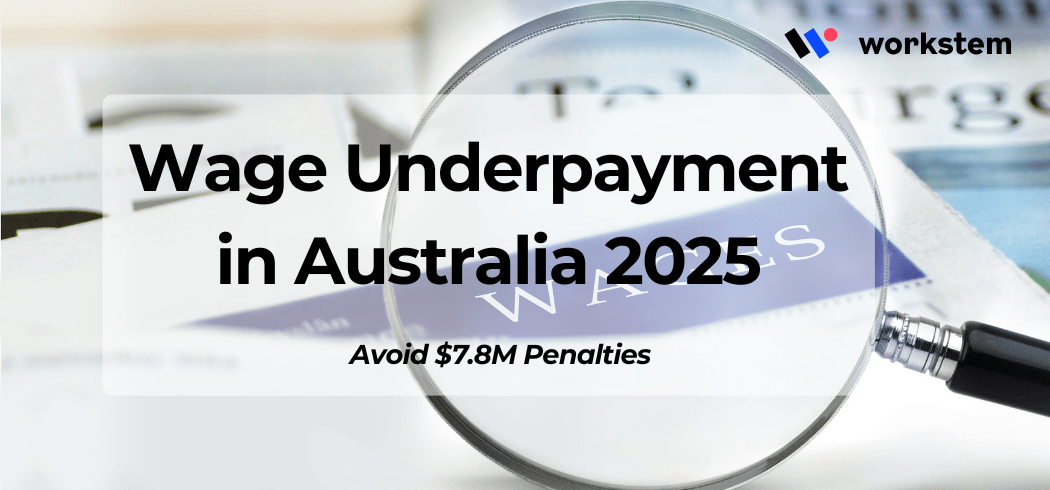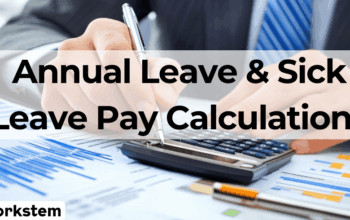Table of content
- What Makes Wage Underpayment a $1 Billion Problem in Australia?
- Case Study: How a Melbourne Retailer Avoided $2.4M in Penalties
- When Should Businesses Act to Prevent Wage Underpayment Issues?
- How Did They Achieve Zero Risk Status?
- Where Can Businesses Find Support for Payroll Compliance?
- How Workstem Simplifies Payroll Compliance
- FAQs About Payroll Compliance
With criminal penalties for underpayment of wages now reaching $7.825 million and up to 10-year prison sentences, Australian businesses face unprecedented risks. Major corporations have already paid millions in penalties, but smart payroll compliance strategies can transform your business from high-risk to fully compliant.
What Makes Wage Underpayment a $1 Billion Problem in Australia?
The Queensland Parliamentary findings reveal underpayment of wages affects 437,000 workers annually, costing over $1 billion in unpaid wages. High-profile cases involving 2 of the big 4 banks (with one around $128 million), and a global pizza chain demonstrate that no business is immune to payroll compliance Australia failures.
The new criminal provisions effective January 2025 have fundamentally changed the landscape, making payroll compliance a boardroom priority rather than just an HR concern.
Case Study: How a Melbourne Retailer Avoided $2.4M in Penalties
The Crisis Point
A mid-sized Melbourne retail chain discovered systematic underpayment of wages affecting 340 employees over three years during a routine audit. Initial calculations suggested:
- $800,000 in underpayments
- Potential penalties up to $2.4 million under serious contravention provisions
- Criminal prosecution risk for senior management
Why Did Underpayment of Wages Occur Despite Good Intentions?
The root causes of their payroll compliance failure included:
- Complex Award Interpretation: Misclassified employees under incorrect retail awards
- System Limitations: Legacy payroll software couldn’t handle modern award complexity
- Inadequate Training: Payroll staff lacked updates on payroll compliance Australia changes
- Poor Documentation: Missing records made rectification difficult
When Should Businesses Act to Prevent Wage Underpayment Issues?
Immediate action points for payroll compliance include:
Proactive Self-Disclosure (Month 1-2)
The company immediately self-reported to Fair Work Ombudsman, demonstrating cooperation and good faith that is crucial for avoiding criminal charges under new underpayment of wages laws.
Comprehensive Payroll Audit (Month 2-3)
Engaged external specialists to review all payroll compliance processes, identifying:
- 15 different award classification errors
- Systematic overtime calculation mistakes
- Superannuation underpayments totaling $120,000
System Overhaul (Month 3-6)
Implemented cloud-based payroll solution with automated payroll compliance Australia checks, including:
- Real-time award interpretation
- Automatic penalty rate calculations
- Integrated Single Touch Payroll reporting
- Audit trail maintenance for all changes
How Did They Achieve Zero Risk Status?
Step 1: Complete Remediation Program
- Back-paid all affected employees within 90 days
- Added interest compensation at ATO rates
- Provided detailed individual statements showing calculation methodology
Step 2: Voluntary Compliance Agreement
Entered Fair Work Ombudsman’s cooperative compliance program, demonstrating commitment to payroll compliance through:
- Quarterly independent audits
- Monthly internal reviews
- Staff training certification
- Public commitment to wage transparency
Step 3: Technology Integration
Invested in automated payroll compliance systems preventing future underpayment of wages through:
- AI-powered award interpretation
- Real-time error detection
- Predictive compliance analytics
- Automated regulatory update integration via Fair Work API etc.
The Result: From Crisis to Best Practice
- Zero penalties imposed due to proactive cooperation
- 100% payroll compliance Australia score in subsequent audits
- Employee trust restored through transparency
- Became industry benchmark for remediation excellence
Where Can Businesses Find Support for Payroll Compliance?
Resources for preventing underpayment of wages include:
- Fair Work Ombudsman’s Voluntary Small Business Wage Compliance Code
- Professional payroll associations offering payroll compliance certification
- Specialised software solutions like Workstem for automated compliance
- Employment law firms providing preventive audits
How Workstem Simplifies Payroll Compliance
Simplify award interpretation and payroll processing with Workstem, the all-in-one workforce management & payroll software designed for every industry. Our system supports 122+ modern awards & 34 EAs, and keeps you up-to-date with changes in wage rates, penalty rates, and overtime rules.Workstem offers:
- Automated award interpretation
- Real-time wage calculations and timesheet syncing
- Employee self-service app for rosters and payslips
- Seamless integrations with Xero, NetSuite, and more
Choose from our Standard or Advanced plan to suit your business needs, and stay Fair Work compliant with confidence.
Book a free demo with our payroll experts and experience how Workstem can streamline your payroll and workforce operations.
FAQs About Payroll Compliance
Q1: What’s the difference between accidental and criminal wage underpayment?
A1: Accidental underpayment comes from mistakes or system errors and usually leads to civil fines. Criminal wage theft requires proof of intent, cover-ups, or systematic exploitation.
Q2: How can businesses calculate potential penalties for wage underpayment?
A2: Penalties equal the greater of $4.95 million per serious breach or three times the underpayment. Criminal cases can reach $7.825 million plus jail for executives.
Q3: What protection does the Voluntary Compliance Code offer?
A3: Small businesses that self-audit, fix errors quickly, and show genuine compliance efforts may avoid criminal prosecution for unintentional underpayment.
Q4: Can insurance cover wage underpayment penalties?
A4: Most insurers exclude wage theft. Directors’ liability insurance may cover unintentional breaches, but criminal penalties can’t be insured under Australian law.
Q5: How long do businesses have to rectify underpayment issues?
A5: Employees can claim underpayments for six years. Immediate self-disclosure and repayment shows good faith and reduces penalty risks.
Read More:
Australian Payroll Compliance 2025: Essential Guide for Employers








